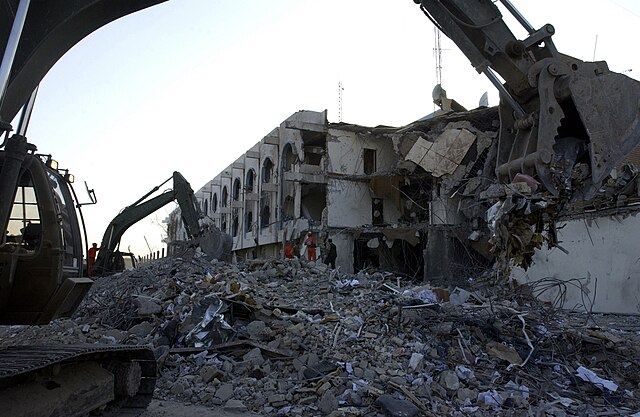Human rights in post-invasion Iraq
Human rights in post-invasion Iraq have been the subject of concerns and controversies since the 2003 U.S. invasion. Concerns have been expressed about conduct by insurgents, the U.S.-led coalition forces and the Iraqi government. The U.S. is investigating several allegations of violations of international and internal standards of conduct in isolated incidents by its own forces and contractors. The UK is also conducting investigations of alleged human rights abuses by its forces. War crime tribunals and criminal prosecution of the numerous crimes by insurgents are likely years away. In late February 2009, the U.S. State Department released a report on the human rights situation in Iraq, looking back on the prior year (2008).
Shops in Zakho after the 2011 Dohuk riots
The UN headquarters building in Baghdad after the Canal Hotel bombing, on 22 August 2003
An Iraqi vehicle burns in Baghdad after being hit by a mortar that was fired by insurgents, 8 August 2006
The Islamic State of Iraq captured and subsequently murdered three U.S. soldiers in May 2007
Occupation of Iraq (2003–2011)
The Occupation of Iraq (2003–2011) was characterized by a large United States military deployment on Iraqi territory, beginning with the US-led invasion of the country in March 2003 which overthrew the Ba'ath Party government of Saddam Hussein and ending with the departure of US troops from the country in 2011. Troops for the occupation came primarily from the United States, the United Kingdom, and Australia, but 29 other nations also provided troops, and there were varying levels of assistance from Japan and other countries, as well as tens of thousands of private military company personnel.
US Army soldiers provide security on foot patrol in Ramadi, 16 August 2006
Marines from D Company, 3rd Light Armored Reconnaissance Battalion guard detainees prior to loading them into their vehicle
Statue of Saddam Hussein being toppled in Baghdad's Firdos Square on 9 April 2003.
Canal Hotel Bombing







